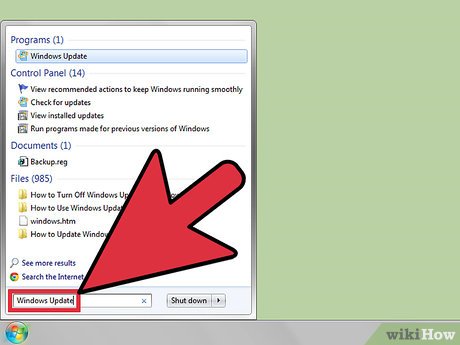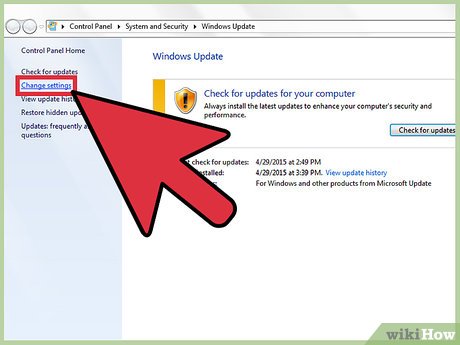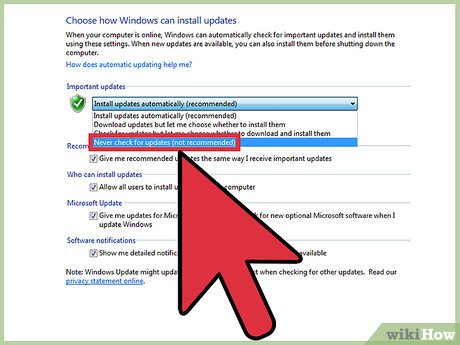How to Configure Automatic Updates in Windows
Method 1 of 2:
Windows 7
-
 Open the Startmenu. This can be achieved by clicking the multicolored Windows 7 Start orb at the bottom-left of your screen.
Open the Startmenu. This can be achieved by clicking the multicolored Windows 7 Start orb at the bottom-left of your screen.
- You can also press the ⊞ Win key on your keyboard.
-
 Begin typing windows update. A search will initiate.
Begin typing windows update. A search will initiate. -
 Select the matching result. It's located at the top of the Start menu.
Select the matching result. It's located at the top of the Start menu. -
 Open the Windows Update settings. Select "change settings" from the upper part of the left pane.
Open the Windows Update settings. Select "change settings" from the upper part of the left pane. -
 Open the dropdown menu under the "Important Updates" header. The list will show the ways in which you can manage the Windows updates. The options are as follows:[1]
Open the dropdown menu under the "Important Updates" header. The list will show the ways in which you can manage the Windows updates. The options are as follows:[1]- Install updates automatically (recommended): Selecting this option will automate the entire process of downloading and installing the updates. This feature is recommended only if you have high or unlimited bandwidth allowance. Windows updates comprise of big files and their regular download may lead to high data usage charges.
- You can choose when and how often your computer does so. Select "Every day" or a particular day of the week, and then the time of day. If your computer is inactive at that time, updates will be installed at the next opportunity.
- Download updates but let me choose whether to install them: This option is suitable only if you have suitable bandwidth allowance but have limited hard drive space. Windows will download the updates and then it will allow you to choose which updates are to be installed and which of them are to be discarded.
- Check for updates but let me choose whether to download and install them: Choosing this option, you allow Windows to scan for the available updates, but it can only download and install them after you choose the ones to install.
- Never check for updates (not recommended): Selecting this option will restrict Windows from searching, downloading or installing any updates. Choosing this option will not lead to any system malfunction in any way.
- Install updates automatically (recommended): Selecting this option will automate the entire process of downloading and installing the updates. This feature is recommended only if you have high or unlimited bandwidth allowance. Windows updates comprise of big files and their regular download may lead to high data usage charges.
-
 Chose which option you want.
Chose which option you want. -
 Save your changes. Click the gray OK button at the bottom of the page.
Save your changes. Click the gray OK button at the bottom of the page.
Method 2 of 2:
Windows 8
-
 Swipe in from the right side of your screen and select 'Settings.'
Swipe in from the right side of your screen and select 'Settings.'- If using a mouse, point to the lower right corner of your screen, move the mouse pointer up, and select 'Settings.'
-
 Click on 'Change PC settings,' then select 'Update and recovery.'
Click on 'Change PC settings,' then select 'Update and recovery.' -
 Select 'Choose how updates get installed.'
Select 'Choose how updates get installed.' -
 Open the dropdown menu under the "Important Updates" header. The list will show the ways in which you can manage the Windows updates. The options are as follows:
Open the dropdown menu under the "Important Updates" header. The list will show the ways in which you can manage the Windows updates. The options are as follows:- Install updates automatically (recommended): Selecting this option will automate the entire process of downloading and installing the updates. This feature is recommended only if you have high or unlimited bandwidth allowance. Windows updates comprise of big files and their regular download may lead to high data usage charges.
- You can choose when and how often your computer does so. Select "Every day" or a particular day of the week, and then the time of day. If your computer is inactive at that time, updates will be installed at the next opportunity.
- Download updates but let me choose whether to install them: This option is suitable only if you have suitable bandwidth allowance but have limited hard drive space. Windows will download the updates and then it will allow you to choose which updates are to be installed and which of them are to be discarded.
- Check for updates but let me choose whether to download and install them: Choosing this option, you allow Windows to scan for the available updates, but it can only download and install them after you choose the ones to install.
- Never check for updates (not recommended): Selecting this option will restrict Windows from searching, downloading or installing any updates. Choosing this option will not lead to any system malfunction in any way.
- Install updates automatically (recommended): Selecting this option will automate the entire process of downloading and installing the updates. This feature is recommended only if you have high or unlimited bandwidth allowance. Windows updates comprise of big files and their regular download may lead to high data usage charges.
-
 Choose whether or not you want Windows to, "'Give me recommended updates the same way I receive important updates" then click on 'Apply.'
Choose whether or not you want Windows to, "'Give me recommended updates the same way I receive important updates" then click on 'Apply.' -
 That's it! you're done, Windows will now install updates based on your preferences later on. You can now close out of the settings window.
That's it! you're done, Windows will now install updates based on your preferences later on. You can now close out of the settings window.
Share by
Isabella Humphrey
Update 04 March 2020













